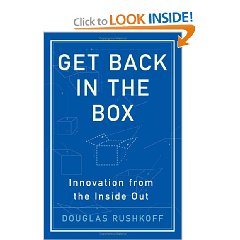Drawing largely on his own experiences as a cyber-world observer, the author comes to conclusions that are solidly supported by many other works that he does not cite (out of his primary area of interest) but that strongly support his independently derived conclusions. I refer to the various works on collective intelligence (Atlee, Bloom, Levy, Steele, Wells), additional works on the power of knowledge driven organizations (Buckman, Wheatley), and on the sources of innovation through intrapreneurship (Pinchot, Christensen, Raynor), and finally, the wealth of knowledge (Stewart) and infinite wealth (Carter).
What I found most helpful in this book was its preamble, in which the author systematically pointed out that the war metaphors of business, the survival of the fittest, the assumption that we are all in competition with one another, and the centralization and manipulation of money, have all led to pathological behavior and distorted priorities that actually diminish what can be shared and created. In this the author is consistent with Tiger (The Manufacture of Evil) and various works today on immoral capitalism (Greider, Prestowitz, Perkins).
He carries the argument further by suggesting that big is bad and that most giant enterprises have lost sight of their core competencies. They are so busy making money and outsourcing to cut costs that they literally “lose it.” At the same time, they struggle desperately to “brand” to manipulate customers, to reinvent old products, etc. At the same time, the constant focus by merchants on short term profits reduces trust–as the author says, no long-term focus reduces trust. This is an important point. He writes at length about Wal-Mart as the poster child for abusing communities that lose three jobs for every two lower-paying jobs that Wal-Mart brings in, with fewer benefits, longer hours. The number of Wal-Mart employees that are below the poverty line is quite shocking. Wal-Mart is exporting good jobs to China and importing menial badly-paying jobs to the USA.
In the middle of the book he addresses social currency, and suggests that most activities are not really about achieving specific goals or buying specific things, but rather about out-reach and networking–the primary human motivator is communion, and the fragmentation of the marketplace and the commoditization of the employee have blocked that.
The book concludes with what could be said to be a very worthwhile mantra: businesses should answer real needs, everyone should collaborate rather than compete, and the over-all objective is to form communities by integrating the views and needs of employees, clients, stockholders, host communities, etc. He makes reference to addressing the needs of the bottom four billion people (per C. K. Prahalad's pioneering work), and has some very exciting references to a new business that allows cell phones to dial in to databases that offer Internet-like access for very narrow needs (e.g. crop prices or new cases of a specific disease.
A central thesis of the book is that open source software reflects the needed attributes of the current and future networking environments. Larger groups of people collaborating openly are consistently more effective than smaller groups working in secrecy. As a side note, the author buries the current obsession of the U.S. Intelligence Community with anonymous access to the Internet (not directly but as a former intelligence officer I see this in what he says). He points out that social currency–being visible, being valued, sharing what you are interested in, seeing what others are interested in, is a *fundamental* aspect of the global networked brain. In other words, the U.S. Intelligence Community, by insisting on anonymous access to the Internet, is isolating itself and seeing the world through blurred lenses.
The title of this book, while cute, might better have been “look under the hood.” The author is compelling and interesting as he names specific consultants and specific companies all floundering to find new ways of getting money from customers, without ever actually looking under the hood of the car they are driving, and getting back to the fundamentals of their core competency. I am reminded of the U.S. Intelligence Community again–Ambassador Negroponte, a diplomat and a neo-conservative, is essentially in the same position as the ill-fated Dutch financier that took over Shell oil and had no idea how to run an energy company. His financial metrics were simply irrelevant, and over time Shell lost the ability to grow truly inspired geologists and engineers who had “the feeling in the fingertips” that the Germans stress so much.
The author makes specific reference to large mergers being the death rattle of an industry–one can easily see this in the U.S. Defense industry, with L-3 buying Titan, General Dynamics buying Anteon, Lockheed lusting after this and that—the dinosaurs are in-breeding (and cashing out), and have completely lost the ability to meet real needs at a fair price with a decent amount of on the fly innovation. They will be beaten by small, fast, and often foreign providers.
Over-all, I found this book inspirational, reasonable, and very very worthwhile.





